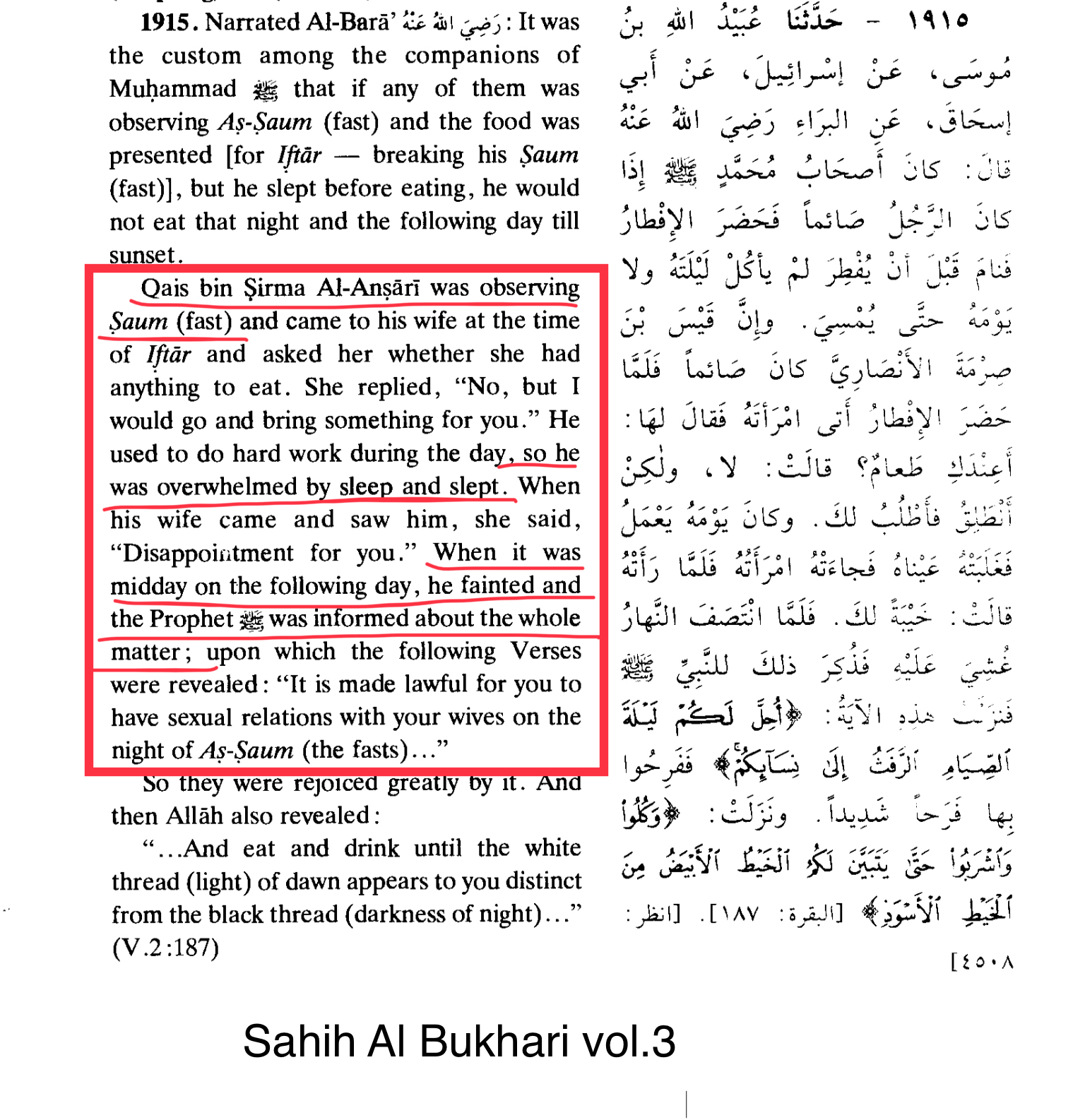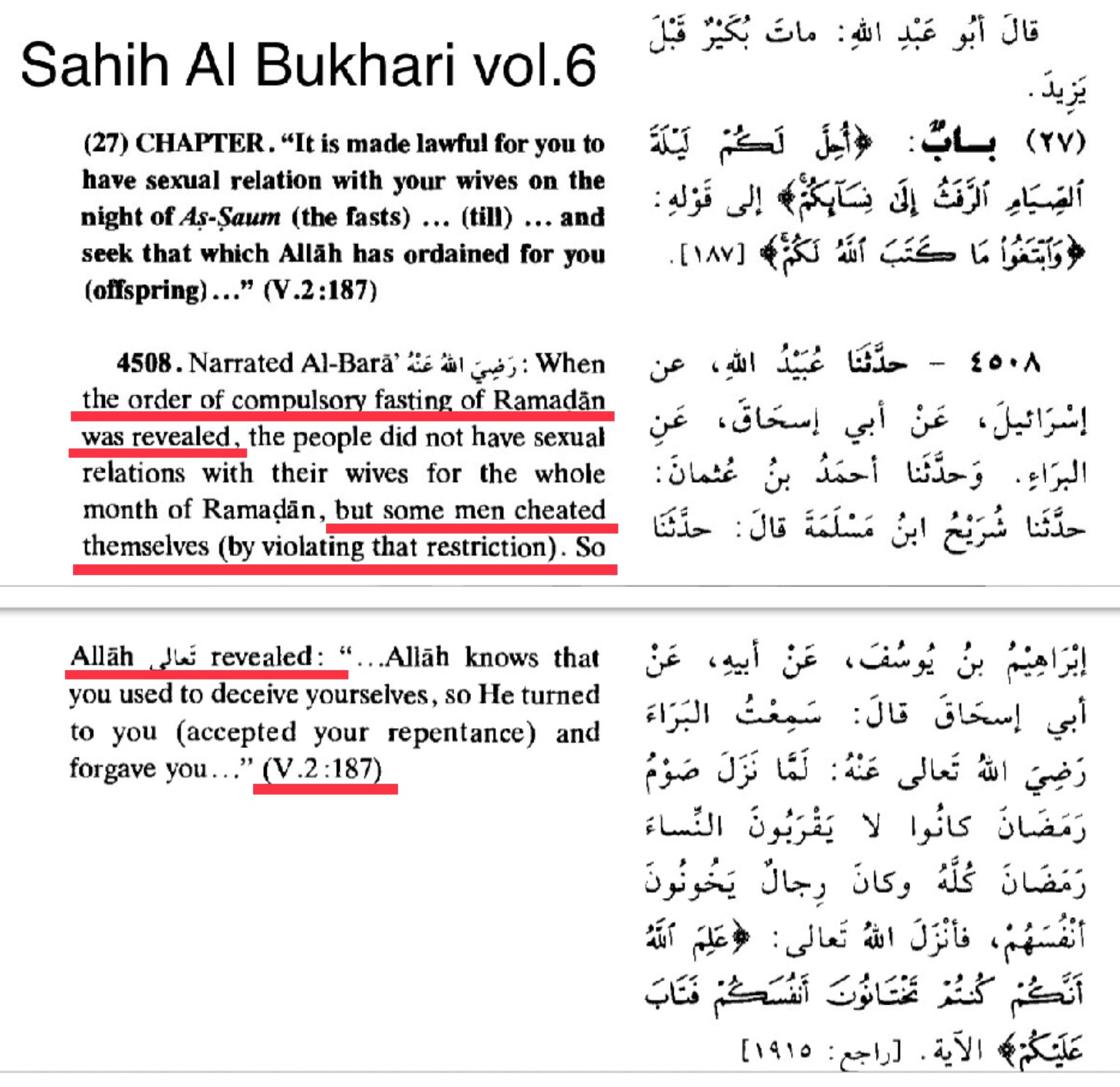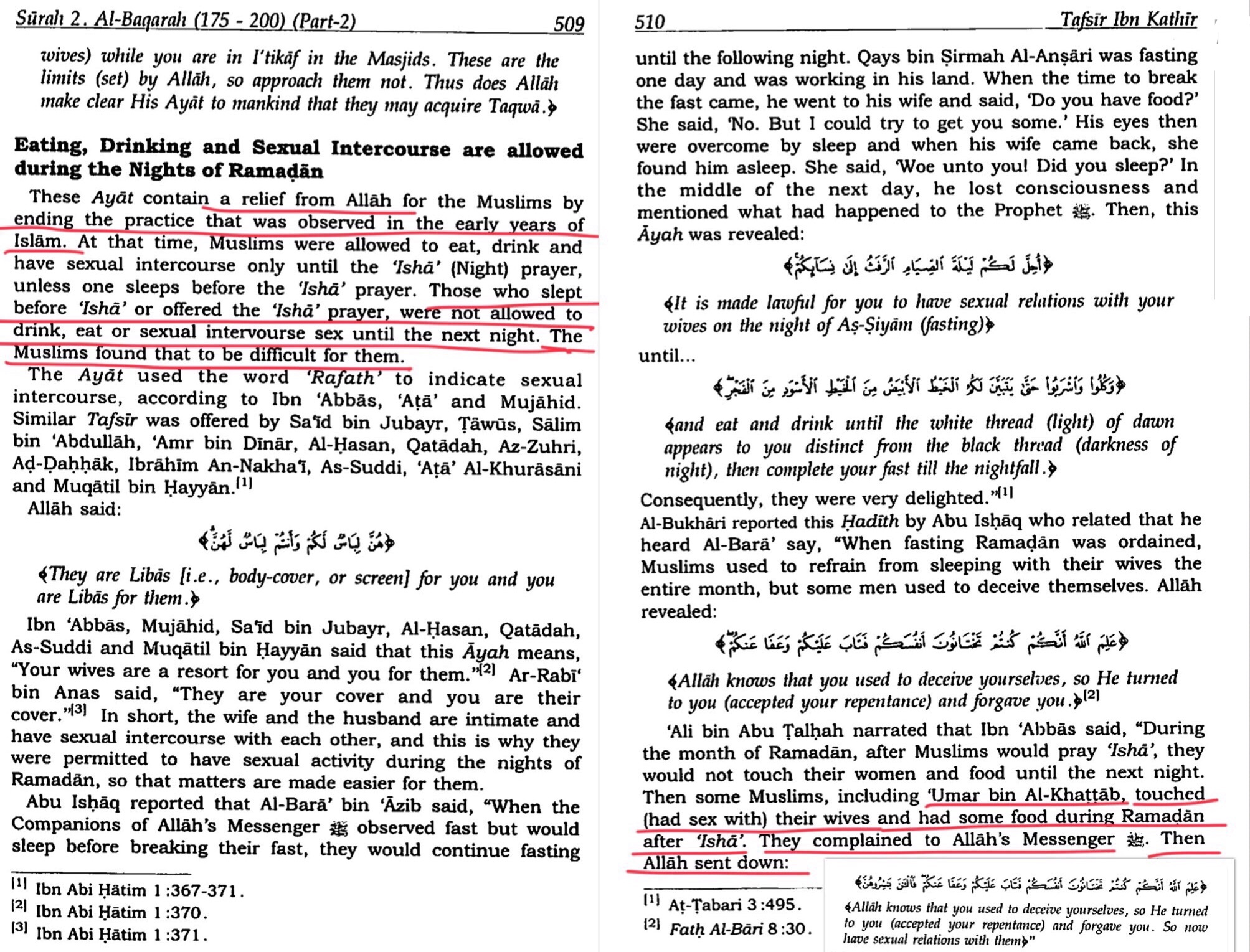The evidence for Islam’s falsehood: the verse regarding Ramadan fasting
This article will expose the falsehood of islam through one of its pillars, by showing the historical background of verse 2:187 as it was conveniently and strongly encouraged by one of Mohammed’s closest and most trusted companion. We are talking about someone who was so important and influential to even create an “updated” revelation for Ramadan with the intent of sorting out the issues that came along the early period Ramadan was implemented.
If nowadays all Muslims at Ramadan are allowed to break the fast at sunset and keep eating and drinking until dawn, they should thank Umar, the great revelation fixer.
It’s quite an easy task to prove that Islam is a merely human invention and expose the Islamic ideology as nothing spiritual but the simple result of a bunch of people’s ideas driven by material and criminal purposes. Throughout the most important Islamic sources we find a large amount of mistakes, contradictions, useful verses “revealed” only for Mohammed’s and his friends’ convenience, as well as several episodes where we read about the real author of certain verses acknowledging his role as some kind of ghost-writer of the Quran.
All kinds of evidence for Islam’s falsehood turn up as soon as we start reading the sources and learn about the circumstances many verses of the Quran actually originated from.
We should not forget what Muslims always tell us about the verses in the Quran, that is “we should not read the verses out of their context”, so we will always follow this advice to find the truth about Islam.
During the month of Ramadan Muslims must abstain from food, water and sexual intercourse from dawn to sunset, that is between the call to prayer of Fajr and the call to prayer of Maghrib. Fasting is then broken with the so called Iftar (dinner). The fasting starts over the next day at dawn (Fajr call to prayer) after the Suhoor (breakfast).
In the early period this practice was being implemented however, the rules were even harder, as Mohammed’s followers would just follow what was revealed in verses 2:183-185 of the Quran:
“O you who have believed, decreed upon you is fasting as it was decreed upon those before you that you may become righteous – [Fasting for] a limited number of days. So whoever among you is ill or on a journey [during them] – then an equal number of days [are to be made up]. And upon those who are able [to fast, but with hardship] – a ransom [as subs- titute] of feeding a poor person [each day]. And whoever volunteers good [i.e., excess] – it is better for him. But to fast is best for you, if you only knew.
The month of Ramadhān [is that] in which was revealed the Qur’ān, a guid- ance for the people and clear proofs of guidance and criterion. So whoever sights [the new moon of] the month,55 let him fast it; and whoever is ill or on a journey – then an equal number of oth- er days. God intends for you ease and does not intend for you hardship and [wants] for you to complete the period and to glorify God for that [to] which He has guided you; and perhaps you will be grateful”.
At the time of these “revelations”, Muslims would still break the fast at sunset (at the Maghrib prayer). However, they were only allowed to drink, eat and have sex until the call of the Isha prayer later in the evening, implying that drinking and eating until dawn was not permitted. The same would apply to sexual intercourse.
In other words, the time slot where having food and water was permissible only stretched between the sunset prayer (maghrib) and the evening one (Isha). After the latter, every Muslim was required to resume with fasting and abstinence, in Arabic Saum.
This might seem tough, but there was another extreme condition that would end up in pure cruelty. If anyone who was exhausted ever happened to accidentally fall and stay asleep beyond the evening prayer deadline, that would imply that he would be bound to carry on fasting until the next day, thus resulting in a full two-day-fast.
In this hadith from Sahih Al Bukhari (vol.3, n. 1915) we find out that a man named Qais bin Sirma Al Ansari found himself in this grim circumstance: he was extremely tired , so he fell asleep, didn’t wake up by the call of the Isha prayer and eventually had to fast another full day. He ended up passing out at work at midday the next day.
This unpleasant episode came to Mohammed’s attention, who in turn revealed verse 2:187, allowing Muslims to eat, drink and have sexual intercourse until dawn.
However, this is not quite the full picture. This hadith alone in fact is not sufficient to fully explain the events that actually resulted in the final Ramadan prescription as we know it nowadays.
Those who told Mohammed about the accident regarding Qays took the chance to express their disappointment and discontent over the rules of fasting during Ramadan.
At that time, not all Muslims were following the compulsory fasting and abstinence, as they considered this practice NOT feasible and simply too hard to carry out. This lack of obedience is confirmed in this other hadith of Sahih Al Bukhari (volume 6, book 60, number 4508), where we read that Allah acknowledged the Islamically unlawful behaviour of his followers:
Narrated Al-Bara’ :“When the order of compulsory fasting of Ramadan was revealed, the people did not have sexual relations with their wives for the whole month of Ramadan, but some men cheated themselves (by violating that restriction). So Allah revealed verse 2:187”:
«It has been made permissible for you the night preceding fasting to go to your wives [for sexual relations]. They are clothing for you and you are clothing for them. God knows that you used to deceive yourselves, so He accepted your repentance and forgave you. So now, have relations with them and seek that which God has decreed for you [i.e., offspring]. And eat and drink until the white thread of dawn becomes dis-tinct to you from the black thread [of night]. Then complete the fast until the night [i.e., sunset]. And do not have relations with them as long as you are staying for worship in the mosques. These are the limits [set by] God, so do not approach them. Thus does God make clear His verses [i.e., ordinances] to the people that they may become righteous ».
Before we get deeper into the verse through the related Tafsir, it’s obvious that something is not right here. Let’s take a look at the situation up to this point. We see Mohammed himself on the authority of Allah giving a specific order on fasting at Ramadan. Then, several people break this rule. However, what makes it quite bizarre is Allah’s reaction.
Not only does Allah conveniently forgive the transgressors, but he even changes his previous strict orders into something new, releasing a new revelation that is based exactly on the transgression. In other words we now have a new prescription that is based exactly on those Muslims’ disobedient behaviour.
It’s amazing to see how Allah makes such Islamic-law-breaking Muslims some sort of inspirational source for a newly updated revelation.
This sequence of events leading to the “revelation” of verse 2:187 has nothing divine whatsoever, because it’s just some sort of update or tweaking work carried out by some human being.
When we finally read the Tafsir of verse 2:187, we inevitably find out Umar Ibn Al Khattab was the key person behind the whole process.
In the Tafsir of ibn Kathir we read that Muslims found the conditions originally imposed at Ramadan to be very hard and extreme.
It’s quite logical to expect the Muslims to be quite disappointed at that time, especially among the most powerful and influential ones.
Among those complaining Muslims Umar stood out, as his rank was so high that he didn’t hesitate to reject the “divine” rules of Allah on fasting.
Umar was then joined in the “disobedience” by other companions, to the extent that they all walked up to Mohammed to bring up what had occurred to Qays and complain about those strict rules.
Umar was such an influential person so that he didn’t hesitate to take advantage of his rank to replace the original prescription regarding fasting with a new one, more suitable to his needs and habits.
Umar turned out to be a key figure in achieving an “amended revelation” that could allow every Muslim to break both fast and abstinence and keep doing so until dawn.
Furthermore, both the Tafsir of Al Wahidi and Jalalayn confirm Umar’s role in the circumstance, even though they tend to describe Umar as someone who repented for his transgression after confessing to it.
It makes no substantial difference since, again, the “bad deed” which should be the reason of Umar’s repentance is transformed into a new and updated prescription coming from Allah. Umar simply had what he wanted, so it’s quite hard to see the future caliph full of repentance in a sea of tears.
As the Islamic sources point out, it’s pretty clear how this “revelation” is nothing divine, but the result of the ambition and the thirst for controlling power of a bunch of people who never even cared about giving some sort of prophetic-like appearance to it, ending up with a series of convenient prescriptions, often turning out with mistakes and corrections, depending on the circumstances these “revelations” were brought in.
We can expect what the possible Muslim objections might be:
“You are wrong. Verse 2:187 has the only purpose of completing Allah’s revelations, because the previous verses on the matter didn’t have any information about the fasting times, nor do they contradict this verse. The Muslim people then were just confused and needed a clarification from Allah as they didn’t know what to do, but the whole Quran comes from Allah”.
Several points refute this argument:
• As we read through verse 2:187, we learn this verse doesn’t talk about people who might be unaware, confused or let astray. It clearly deals with those people who were “deceiving themselves and whose repentance was accepted by Allah”. Thus, as repentance and forgiveness are involved in this verse, that means those affected by that were really breaking an official rule issued by Allah. This means the prescription was there, well known and understood as part of a procedure Mohammed had imposed.
• As for the Quran as “Allah’s eternal and uncreated word”, there is no point in believing in Allah as a mighty, wise and all-knowing God if then it turns out he has to release another revelations to fill and fix his gaps, lacks and mistakes as well as correct the behaviours brought about by his followers’ conduct as they obey some former faulty prescription coming from him. Most importantly, Allah is giving an “updated” revelation only due to the fact that Umar and other Muslims broke his rules and explicitly complained about what was imposed upon them. Furthermore, the final revelation given on the matter doesn’t correct Umar’s wrong behaviour: it lines up with it instead.
• The other Muslim companions who were unhappy about the fasting rules actually complained about the tough conditions. They didn’t complain about any rules “not being clear”.
• The above mentioned hadith of Sahih Al Bukhari (volume 6, book 60, number 4508) says “some men cheated themselves”, thus implying a group of people violated an authoritative prescription.
It’s quite embarrassing to notice how someone claiming to be speaking on behalf of Allah always has to come to terms with his bizarre ideas again, as he ends up being abrogated by an associate partner after finding out his initial “divine” prescription was just not feasible as it not followed by his companions.
The need to amend this prescription and fix its mistakes clears up how the whole concept of Allah’s revelation is nothing but a man made invention. It’s obvious how Mohammed was not the only author and how everything is carried out by a group of people who were quite aware of the fake nature of Mohammed’s supposed prophethood.
In this very circumstance it looks like this is how the event unfolds, just like a meeting between associate partners in a company : «we agreed it’s impossible to keep fast this way. We had it revealed by Allah, but you couldn’t abide by the rules, so… let’s do it like this: you are “forgiven” and from now on we are allowed we can carry on eating until dawn, that is until the fajr prayer!».
Final questions for our Muslim friends.
Considering Umar’s contribution to the Quranic revelations and how he even bragged about being the ghost-writer, do you really think Umar really believed the fasting prescription of Ramadan he amended was divine?
Do you really think that Umar, one of the best Muslim in history, an influential man close to Mohammed, the inventor of the Islamic veil, could believe the Ramadan fasting revelation and all the other verses came from Allah?
Do you really think Umar ever practiced Ramadan like a divine pillar of Islam, when he himself blatantly violated the former rule and later revised it?
But most of all, since Umar himself turned out to be the real maker of several important “revelations” and even ended up questioning the preservation of the Quran, do really think that such a powerful and influencing person ever believed in Allah and his “prophet” Mohammed?




I have just finished reading your views about a few verses and hadiths .What the points you are taking to prove that the Quran revealed by The Almighty Allah is just a book spoken by The Prophet .So many Weak points I noticed in your writings .First of All ,you are neither a mind of positiveness nor a person fully aware of the Quranic Text ..
Your allegations are nothing but your ignorance or a bit of knowledge of islam .
The message can be copied or conveyed to the people of that time in mecca when the literacy or the linguistics style of writing of poetry or prose is in its peak .I request you to understand and read the orginal text written in Arabic ,when your read it ,you can understand the language ,the figure of speech and the unique style and the scientific fact that were not possible to be written or told by anyone other than The Almighty Allah .
The cadence ,the rhythm and the sentence formation used in the Quran in written form is not possible to be written by a man but Allah .
For your all doubts to be cleared , you can listen to the audio video lectures of Dr.Zakir Naik ..